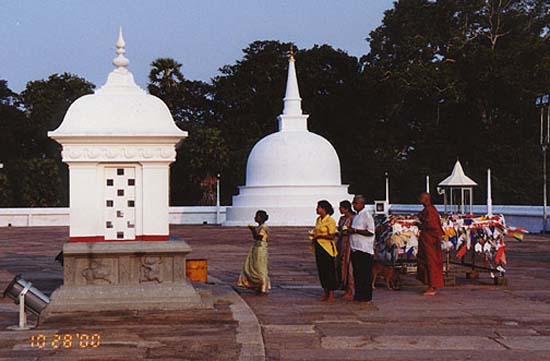
Nepal RPCV Peter Burleigh revisits Sri Lanka
In January, less than three weeks after I arrived in Colombo as the American Ambassador to Sri Lanka and the nearby archipelago nation, the Republic of the Maldives, a massive truck bomb detonated in downtown Colombo, targeting the nation's Central Bank and nearby major private sector banks, insurance companies and five-star tourist hotels.
Our Embassy chancery, where my office is located, shook dramatically from the explosion, and a large part of the sky in the mile-away business center filled with gray clouds of rubble, building parts and flying, probably refracting, shards of office glass.
As the tremor subsided we gathered our emergency action team and deployed all our Embassy resources, in the first instance to determine the condition of all American citizens in the Colombo area. Our throats in our mouths, as the phone system went dead, we remembered that the representative of the International Monetary Fund in Sri Lanka is an American. Two hours later we learned that he had survived the blast, though his office had collapsed. He managed to get out of the building and join his wife at home. They have decided to stay in Sri Lanka.
Then we learned from the Overseas Children's School, where all our children go to school here, that an entire busload of first graders was on a field trip half a block from the epicenter of the bomb. In any event, they were safe in the Hilton Hotel, which was amazingly unaffected by the blast though very near to it.
Not so fortunate were about 100 civilian Sri Lankans who died, and more than a thousand injured, some blinded by the flying glass shards, some brain injured, some bloody but with only superficial wounds. Another terrorist act in a world unfortunately inured to such events.
Since that day my life, and that of our U.S. government agencies in Sri Lanka -- AID, USIA, Peace Corps, Department of Defense, Voice of America, in addition to the State Department -- has been more routine.
We monitor the conflict, looking for ways we might be able to help bring peace and normalcy back. We press the case for American investors, trade relations, and increasing Sri Lanka's purchase of U.S. goods and services. We offer advice and comment, on request, regarding conflict resolution and constitutional reforms aimed at establishing a workable federal system of governance. And we monitor the security of American citizens here -- there are about 900 of us -- and provide the normal visa and pass-port, as well as other consular services.
While in Washington in the '80s I was the State Department's office director for Iran and Iraq at the time Ollie North was causing cakes to be sent to Tehran. When I was called by the press for a comment on the then-breaking story of "Irangate," I said it was inconceivable to me that the U.S. government had facilitated arms deliveries to Iran.
In 1991, as readers of the Scene may recall, I was nominated by President Bush as Ambassador to Iraq. That nomination never went forward, overtaken by the Iraqui invasion of Kuwait, and later the Gulf War.
Instead of going to Baghdad, I was appointed Coordinator (and Ambassador) for Counter-Terrorism. During that assignment I was proud that we sustained a tougher policy and got our hostages out of Lebanon. It was also a professional high point to have the United Nations Security Council impose unprecedented sanctions on Libya for its destruction of Pan Am 103 over Lockerbie, Scotland, in which so many died, including college students from Colgate and Syracuse universities.
For the past three years I served as Deputy Assistant Secretary for Personnel, perhaps my most difficult job. In an era of budget uncertainties, "downsizing," controversy over diversity issues in the Foreign Service, lawsuits against the State Department alleging gender and race discrimination, and an explosion of feelings of victimization throughout the work force, it was difficult to focus attention on State's main role: advancement of U.S. interests overseas.
Thus, now back in Sri Lanka after 25 years, I consider it my basic task to make our limited presence here relevant. The injection of American know-how, advice, volunteer work -- in the economic development, promotion of a socially concerned private sector, and in the protection of human rights and dignity in a country in the midst of a 13-year-long ethnic conflict -- are all on the agenda.
Sri Lanka is a long way from the U.S. but it boasts a long-established democractic system, high standards of literacy and health, and a now intense desire to restore civil peace and re-focus national energy on economic growth and job expansion. In the context of peaceful restoration of deep conflict, these are goals it is natural for Americans to support, as we can. That's what I am doing.
Looking back over these 28 years in the Foreign Service, I think there continues to be a range of rewards -- first and foremost, the ability one has to represent and advocate the best that America stands for: democratic institutions, respect for law and the rights of the individual, freedom of thought, belief and movement -- all still precious goals for much of the world.
Further, in pushing for trade and investment, one hopes to contribute both to the U.S. economy -- and job creation for Americans -- as well as share technology and management skills internationally. Living in exotic places and cultures, learning foreign languages and, above all, deeply relating to (and, hopefully, understanding) nationals of other backgrounds, remain for me a professional and personal "high."
